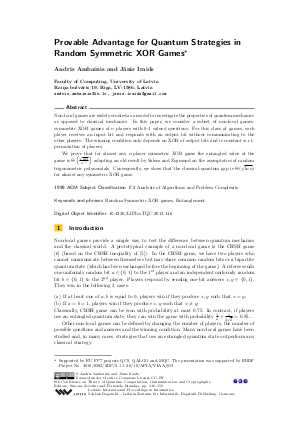Provable Advantage for Quantum Strategies in Random Symmetric XOR Games
Authors Andris Ambainis, Janis Iraids
-
Part of:
Volume:
8th Conference on the Theory of Quantum Computation, Communication and Cryptography (TQC 2013)
Part of: Series: Leibniz International Proceedings in Informatics (LIPIcs)
Part of: Conference: Conference on the Theory of Quantum Computation, Communication and Cryptography (TQC) - License:
 Creative Commons Attribution 3.0 Unported license
Creative Commons Attribution 3.0 Unported license
- Publication Date: 2013-11-13
File

PDF
LIPIcs.TQC.2013.146.pdf
- Filesize: 436 kB
- 11 pages
Document Identifiers
Subject Classification
Keywords
- Random Symmetric XOR games
- Entanglement
Metrics
- Access Statistics
-
Total Accesses (updated on a weekly basis)
0PDF Downloads0Metadata Views
Abstract
Non-local games are widely studied as a model to investigate the properties of quantum mechanics as opposed to classical mechanics. In this paper, we consider a subset of non-local games: symmetric XOR games of n players with 0-1 valued questions. For this class of games, each player receives an input bit and responds with an output bit without communicating to the other players. The winning condition only depends on XOR of output bits and is constant w.r.t. permutation of players. We prove that for almost any n-player symmetric XOR game the entangled value of the game is Theta((sqrt(ln(n)))/(n^{1/4})) adapting an old result by Salem and Zygmund on the asymptotics of random trigonometric polynomials. Consequently, we show that the classical-quantum gap is Theta(sqrt(ln(n))) for almost any symmetric XOR game.
Cite As Get BibTex
Andris Ambainis and Janis Iraids. Provable Advantage for Quantum Strategies in Random Symmetric XOR Games. In 8th Conference on the Theory of Quantum Computation, Communication and Cryptography (TQC 2013). Leibniz International Proceedings in Informatics (LIPIcs), Volume 22, pp. 146-156, Schloss Dagstuhl – Leibniz-Zentrum für Informatik (2013)
https://doi.org/10.4230/LIPIcs.TQC.2013.146
BibTex
@InProceedings{ambainis_et_al:LIPIcs.TQC.2013.146,
author = {Ambainis, Andris and Iraids, Janis},
title = {{Provable Advantage for Quantum Strategies in Random Symmetric XOR Games}},
booktitle = {8th Conference on the Theory of Quantum Computation, Communication and Cryptography (TQC 2013)},
pages = {146--156},
series = {Leibniz International Proceedings in Informatics (LIPIcs)},
ISBN = {978-3-939897-55-2},
ISSN = {1868-8969},
year = {2013},
volume = {22},
editor = {Severini, Simone and Brandao, Fernando},
publisher = {Schloss Dagstuhl -- Leibniz-Zentrum f{\"u}r Informatik},
address = {Dagstuhl, Germany},
URL = {https://drops.dagstuhl.de/entities/document/10.4230/LIPIcs.TQC.2013.146},
URN = {urn:nbn:de:0030-drops-43156},
doi = {10.4230/LIPIcs.TQC.2013.146},
annote = {Keywords: Random Symmetric XOR games, Entanglement}
}
